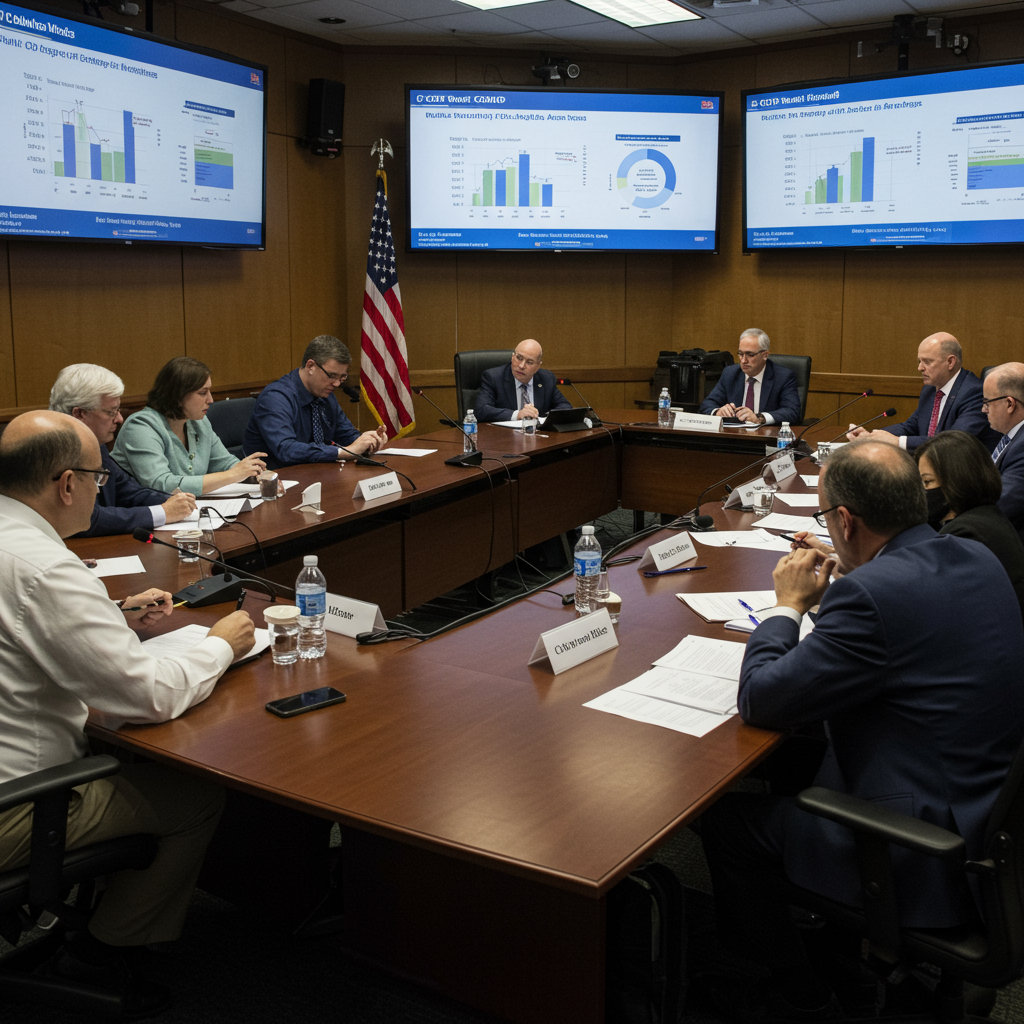A pivotal meeting of the Centers for Disease Control and Prevention’s (CDC) vaccine advisory panel recently unveiled sweeping changes to how Americans access COVID-19 vaccines. This contentious gathering, marked by deep disagreements and procedural chaos, introduced new CDC COVID vaccine rules that could significantly alter public health policy. The federal vaccine advisory group, known as ACIP (Advisory Committee on Immunization Practices), made recommendations designed to reshape vaccine availability and public understanding. This shift arrives amidst a highly politicized environment under Health Secretary Robert F. Kennedy Jr.’s leadership, raising concerns across the medical community about scientific integrity and vaccine access.
The updated guidelines mean securing a COVID-19 vaccine may become more complex than in previous years. While not outright prohibiting vaccination for anyone over six months, the panel’s decisions introduce new hurdles. For many, a simple walk-in vaccination at a pharmacy could become a thing of the past. These developments underscore the ongoing challenges in public health communication and vaccine policy.
The Pivotal ACIP Meeting and its Tumultuous Atmosphere
The recent two-day meeting of the ACIP in Atlanta, Georgia, was anything but routine. It unfolded with palpable tension, procedural missteps, and passionate debates among members and attending experts. Confusion over processes and technical difficulties plagued the proceedings. Notably, Health Secretary Robert F. Kennedy Jr. had recently appointed this committee, replacing the previous panel. Many of his selections, including five members added just before the meeting, have a history of expressing skepticism about vaccines. Kennedy himself once controversially called COVID-19 vaccines a “crime against humanity,” setting a turbulent tone for vaccine policy.
A Panel Under Scrutiny
The new ACIP panel faced immediate scrutiny. Critics argued it sidelined established expert input and elevated questionable data. Dr. Sandra Fryhofer, representing the American Medical Association (AMA), voiced significant concern over the “erosion of the committee’s integrity.” She highlighted worries about how recommendations were being developed, suggesting data was “selectively used to justify specific conclusions.” Furthermore, the voting topics for COVID-19 vaccines were not publicly shared until the meeting’s conclusion, despite transparency requests. ACIP member Retsef Levi, an MIT professor, led much of the discussion. He notably emphasized safety concerns, stating his belief that “the public currently believes the narrative of safe and effective.” This environment starkly contrasted with previous vaccine policy-making processes.
Key Changes to COVID-19 Vaccine Access
The ACIP panel ultimately backed away from its most controversial proposal. This plan would have required states to mandate a prescription for anyone seeking a COVID-19 vaccine. However, the approved recommendations still introduce substantial changes. The group voted to recommend vaccination for adults aged 65 and older and for younger individuals, but under a new process called “shared decision-making.” This represents a significant departure from the “routine vaccine access” of prior seasons, where vaccines were widely encouraged and easily obtained.
Navigating “Shared Decision-Making”
Under the new “shared decision-making” framework, individuals over six months old who wish to receive a COVID-19 vaccine must now engage in a detailed conversation with a clinician. This dialogue aims to cover the risks and benefits of vaccination. For people aged 64 and younger, this discussion must specifically highlight that vaccine benefits are most significant for those at highest risk of severe disease. Conversely, the conversation should clarify that benefits are lowest for individuals without increased risk. As Jen Kates, director of global health and HIV policy at KFF, summarized, this is “a more narrow recommendation” than in past years. The exact practical implications and access pathways for this new process remain somewhat unclear, however.
Adding another layer, advisers also voted that the CDC should incorporate additional information into official sheets. These sheets will now include details about possible risks and uncertainties related to COVID vaccine effectiveness. This decision came despite observations that many such risks were speculative or already known to be unfounded.
The Contentious Prescription Proposal
One of the most heated debates centered on the proposal to require a prescription for all COVID-19 vaccines. This measure, if adopted by states, would have created a new and potentially significant barrier to access. The motion ultimately failed in a tie vote, with ACIP chairman Martin Kulldorff casting the decisive “no.”
Rejection of a Major Hurdle
Strong opposition to the prescription requirement came from within the committee and from external medical experts. Many warned it would lead to fewer vaccinations. Dr. Amy Middleman of the Society for Adolescent Health and Medicine argued such a requirement for primary prevention strategies would “overwhelm physicians’ offices.” Committee members also expressed concerns about creating access problems, particularly for the underinsured or those without primary care providers. Dr. Joseph Hibbeln, an ACIP member, pointed out that approximately 30% of Americans lack ready access to primary healthcare, magnifying these potential issues. The proposal’s defeat prevented what many saw as an unnecessary and harmful barrier to public health.
Broader Implications for Public Health Policy
The ACIP’s new CDC COVID vaccine rules and other decisions have created a fragmented response across the nation. Many states are taking proactive steps to mitigate the potential impact. California, Oregon, and Washington launched a West Coast Health Alliance, for instance, while several Northeast states formed their own collaborative to issue independent vaccine recommendations.
Private insurance companies, represented by America’s Health Insurance Plans, have committed to covering COVID-19 vaccines with no cost-sharing through the end of 2026. However, clarity regarding coverage for public health insurance programs like Medicaid, Medicare, the Children’s Health Insurance Program, and the Vaccines for Children program remains uncertain under the new recommendations. Compounding these access issues, reports indicate patients are already being turned away from pharmacies in various locations, including caregivers for high-risk individuals. This situation creates a “patchwork of policies” reminiscent of the initial, chaotic days of the vaccine rollout, potentially requiring more effort for those seeking vaccination. The ACIP’s recommendations are not yet final; they require the sign-off of acting CDC director Jim O’Neill, who was appointed by Kennedy after his predecessor was ousted for resisting pressure to pre-commit to ACIP recommendations.
Childhood Vaccine Schedule Debates
Beyond COVID-19, the ACIP meeting also addressed other critical childhood immunization policies. The committee navigated controversial decisions regarding the MMRV vaccine (measles, mumps, rubella, and chickenpox combined shot) and the hepatitis B vaccine for newborns. After an initial confusing vote, the panel ultimately reversed itself on the MMRV vaccine for children under four. They decided the federal Vaccines for Children program should no longer cover the combined shot, making it potentially unavailable through key public health programs.
Regarding the hepatitis B vaccine, a proposal to halt the universal birth dose for all babies was deferred indefinitely. This change would have shifted policy to screen mothers first and only vaccinate infants whose mothers did not test negative. CDC scientists strongly defended the universal birth dose, citing its role in dramatically reducing hepatitis B cases and guarding against infection from undiagnosed household members. Medical experts expressed relief at the postponement, emphasizing the vaccine’s proven safety and efficacy. These debates underscore the profound impact of the ACIP’s decisions on long-standing public health strategies.
The Politicization of Public Health Guidance
The entire meeting underscored the turbulent and highly politicized nature of vaccine policy under Health Secretary Robert F. Kennedy Jr. Many clinicians and medical organizations expressed deep concern about the ACIP’s integrity and processes. The American Academy of Pediatrics (AAP) even boycotted the meeting, asserting that federal vaccine policymaking under Kennedy was no longer a “credible process” after medical groups were barred from traditional liaison roles. Former CDC director Susan Monarez testified she was fired for resisting Kennedy’s demands to pre-approve vaccine recommendations and dismiss career scientists, further highlighting political interference.
Eroding Trust and Scientific Integrity
The meeting’s disorganization, combined with the perceived sidelining of expert input and selective use of data, fueled concerns about eroding public trust in scientific institutions. ACIP member Retsef Levi’s comments questioning the “safe and effective” narrative for vaccines, despite overwhelming evidence to the contrary, added to these anxieties. This environment risks creating unjustified public doubts about vaccine safety and efficacy. The actions of this new panel, widely seen as attempting to advance Secretary Kennedy’s goals, have sparked significant alarm among those committed to evidence-based public health.
What This Means For You
Given these new CDC COVID vaccine rules, staying informed is crucial. If you are considering a COVID-19 vaccine, particularly if you are under 65 and not at high risk, be prepared for a more in-depth discussion with your healthcare provider or pharmacist. This “shared decision-making” process is designed to ensure you understand the specific benefits and potential considerations for your individual health profile. It may be wise to contact your preferred pharmacy or doctor’s office in advance to understand their current procedures and ensure vaccine availability. You might also explore state-specific public health websites, as some states are developing their own guidelines to ensure continued access.
Frequently Asked Questions
What are the main changes to COVID-19 vaccine access after the recent ACIP meeting?
The primary change is a shift from “routine vaccine access” to “shared decision-making” for many individuals. This means adults 65 and older, and younger people, will now need to discuss the risks and benefits with a clinician before getting a COVID-19 vaccine. For those 64 and younger, the conversation will emphasize that benefits are greatest for individuals at highest risk of severe disease. Additionally, vaccine information sheets will include more details about potential risks and uncertainties.
Where can I find out if these new COVID vaccine rules affect my insurance coverage?
Private insurance companies, through America’s Health Insurance Plans, have pledged to cover COVID-19 vaccines with no cost-sharing through the end of 2026. However, clarity on coverage for public health programs like Medicaid, Medicare, the Children’s Health Insurance Program, and the Vaccines for Children program remains uncertain. It is advisable to contact your specific insurance provider or state public health department for the most accurate and up-to-date information regarding your coverage.
Should I still get a COVID-19 vaccine given the new shared decision-making process?
The ACIP’s recommendations do not prohibit anyone over six months from getting the shot. The “shared decision-making” process encourages you to speak with a clinician about the risks and benefits to make an informed choice tailored to your health. Experts emphasize that benefits are greatest for those at higher risk of severe disease. Consulting a trusted healthcare provider will help you determine the best course of action for your individual health needs and circumstances under these new CDC COVID vaccine rules.
Conclusion
The recent ACIP meeting has ushered in a new era for vaccine policy in the United States, particularly concerning COVID-19. The adoption of “shared decision-making” and the rejection of a universal prescription requirement represent significant shifts in vaccine access. These CDC COVID vaccine rules reflect a turbulent environment influenced by new leadership and intense political debate. As patients navigate this evolving landscape, proactive engagement with healthcare providers and awareness of state-specific guidelines will be essential. The long-term impact on public health and vaccine uptake remains to be seen, but the emphasis on transparent communication and patient-clinician dialogue will be paramount in maintaining public trust and ensuring equitable access to vital health resources.




